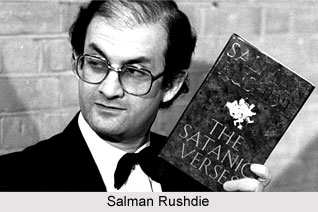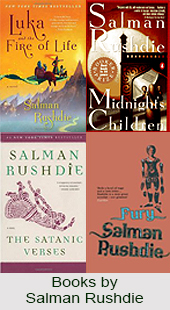 Salman Rushdie who is also known as Sir Ahmad Salman Rushdie, a British Indian writer, writes mostly on magical realism with historical fiction. His most of the works are set on disruptions, and migrations between Eastern and Western civilizations.
Salman Rushdie who is also known as Sir Ahmad Salman Rushdie, a British Indian writer, writes mostly on magical realism with historical fiction. His most of the works are set on disruptions, and migrations between Eastern and Western civilizations.
Early Life of Salman Rushdie
Salman Rushdie was born in Bombay on 19 June 1947. He went to school in Mumbai, Maharashtra and at Rugby in England, and read History at King`s College, Cambridge, where he joined the Cambridge Footlights theatre company. After graduating, he lived with his family who had moved to Pakistan in 1964, and worked briefly in television before returning to England, beginning work as a copywriter for an advertising agency.
Works of Salman Rushdie
Salman Rushdie has his first novel, Grimus that was published in 1975. His second novel, the acclaimed Midnight`s Children, was published in 1981. It won the Booker Prize for Fiction, the James Tait Black Memorial Prize (for fiction), an Arts Council Writers` Award and the English-Speaking Union Award, and in 1993 was judged to have been the `Booker of Bookers`, the best novel to have won the Booker Prize for Fiction in the award`s 25-year history. The novel narrates key events in the history of India through the story of pickle-factory worker Saleem Sinai, one of 1001 children born as India won independence from Britain in 1947. The third novel, Shame (1983), which many critics saw as an allegory of the political situation in Pakistan, won the Prix du Meilleur Livre Etranger and was shortlisted for the Booker Prize for Fiction. The publication in 1988 of his fourth novel, The Satanic Verses, leads to accusations of blasphemy against Islam and demonstrations by Islamist groups in India and Pakistan. The orthodox Iranian leadership issued a fatwa against Salman Rushdie on 14 February 1989 - effectively a sentence of death - and he was forced into hiding under the protection of the British government and police. The book itself centres on the adventures of two Indian actors, Gibreel and Saladin, who fall to earth in Britain when their Air India jet explodes. It won the Whitbread Novel Award in 1988. The Ground Beneath Her Feet, published in 1999, re-works the myth of Orpheus and Eurydice in the context of modern popular music. His most recent novel, Fury, set in New York at the beginning of the third millennium, was published in 2001. He is also the author of a travel narrative, The Jaguar Smile (1987), an account of a visit to Nicaragua in 1986. The subjects in his new book, Step Across This Line: Collected Non-fiction 1992-2002 (2002), range from popular culture and football to twentieth-century literature and politics. Salman Rushdie is also co-author (with Tim Supple and Simon Reade) of the stage adaptation of Midnight`s Children, premiered by the Royal Shakespeare Company in 2002. His other novel "Shalimar The Clown" (2005), is the story of Max Ophuls, his killer and daughter, and a fourth character who links them all. It was short listed for the 2005 Whitbread Novel Award.
Awards Received by Salman Rushdie
Salman Rushdie continued to write and publish books, including a children`s book, Haroun and the Sea of Stories (1990), a warning about the dangers of story-telling that won the Writers` Guild Award (Best Children`s Book), and which he adapted for the stage (with Tim Supple and David Tushingham. It was first staged at the Royal National Theatre, London.) There followed a book of essays entitled Imaginary Homelands: Essays and Criticism 1981-1991 (1991); East, West (1994), a book of short stories; and a novel, The Moor`s Last Sigh (1995), the history of the wealthy Zogoiby family told through the story of Moraes Zogoiby, a young man from Bombay descended from Sultan Muhammad XI, the last Muslim ruler of AndalucA¬a.
Other Works of Salman Rushdie
Salman Rushdie is the Honorary Professor in the Humanities at the Massachusetts Institute of Technology (MIT), and Fellow of the Royal Society of Literature. He was made Distinguished Fellow in Literature at the University of East Anglia in 1995. He was awarded the Austrian State Prize for European Literature in 1993 and the Aristeion Literary Prize in 1996, and has received eight honorary doctorates. He was elected to the Board of American PEN in 2002.
Personal Life of Salman Rushdie
Salman Rushdie has been married four times. He was married to his first wife Clarissa Luard from 1976 to 1987 and fathered a son, Zafar. He left her in the mid-`80s for the Australian writer Robyn Davidson, to whom he was introduced by their mutual friend Bruce Chatwin. His second wife was the American novelist Marianne Wiggins; they were married in 1988 and divorced in 1993. His third wife, from 1997 to 2004, was Elizabeth West; they have a son, Milan. In 2004, Salman Rushdie married the Indian American model Padma Lakshmi. The couple got divorced on 2007 July, 2.
Books by Salman Rushdie
| Grimus (1975) |
| Midnight`s Children (1981) |
| Shame (1983) |
| The Satanic Verses (1988) |
| The Moor`s Last Sigh (1995) |
| The Ground Beneath Her Feet (1999) |
| Fury (2001) |
| Shalimar the Clown (2005) |
| The Enchantress of Florence (2008) |
| Two Years Eight Months and Twenty-Eight Nights (2015) |
| Homeless by Choice (1992, with R. Jhabvala and V. S. Naipaul) |
| East, West (1994) |
| The Best American Short Stories (2008, as Guest Editor) |
| Haroun and the Sea of Stories (1990) |
| Luka and the Fire of Life (2010) |
| The Jaguar Smile: A Nicaraguan Journey (1987) |
| "In Good Faith", Granta, 1990 |
| Imaginary Homelands: Essays and Criticism, 1981-1991 (1992) |
| "The Wizard of Oz: BFI Film Classics", BFI, 1992. |
| "Mohandas Gandhi." Time, 13 April 1998. |
| Step Across This Line: Collected Nonfiction 1992-2002 (2002) |
| "A fine pickle." The Guardian, 28 February 2009. |
| "In the South." Booktrack, 7 February 2012 |
| Joseph Anton: A Memoir (2012) |
Awards Received by Salman Rushdie
| Aristeion Prize (European Union) |
| Arts Council Writers` Award |
| Author of the Year (British Book Awards) |
| Author of the Year (Germany) |
| Booker Prize for Fiction |
| Booker of Bookers for the best novel among the Booker Prize winners for Fiction awarded at its 25th anniversary (in 1993) |
| The Best of the Booker awarded to commemorate the Booker Prize`s 40th anniversary (in 2008 |
| Commandeur de l`Ordre des Arts et des Lettres (France) |
| English-Speaking Union Award |
| Golden PEN Award |
| Hans Christian Andersen Literature Award (2014) |
| Honorary Patron, University Philosophical Society, Trinity College, Dublin. |
| Hutch Crossword Book Award (India) |
| India Abroad Lifetime Achievement Award (USA) |
| James Tait Black Memorial Prize (Fiction) |
| Kurt Tucholsky Prize (Sweden) |
| Mantua Prize (Italy) |
| Norman Mailer Prize (USA) |
| James Joyce Award - University College Dublin |
| Massachusetts Institute of Technology Honorary Professorship |
| Chapman University Honorary Doctorate - Doctor of Humane Letters |
| Outstanding Lifetime Achievement in Cultural Humanism (Harvard University) |
| PEN Pinter Prize (UK) |
| Premio Grinzane Cavour (Italy) |
| Prix Colette (Switzerland) |
| Prix du Meilleur Livre Etranger |
| St. Louis Literary Award - Saint Louis University |
| State Prize for Literature (Austria) |
| Whitbread Novel Award (twice) |
| Writers` Guild of Great Britain Award for Childrens Fiction |
| University of Liège Doctor honoris causa |
 Salman Rushdie who is also known as Sir Ahmad Salman Rushdie, a British Indian writer, writes mostly on magical realism with historical fiction. His most of the works are set on disruptions, and migrations between Eastern and Western civilizations.
Salman Rushdie who is also known as Sir Ahmad Salman Rushdie, a British Indian writer, writes mostly on magical realism with historical fiction. His most of the works are set on disruptions, and migrations between Eastern and Western civilizations.














